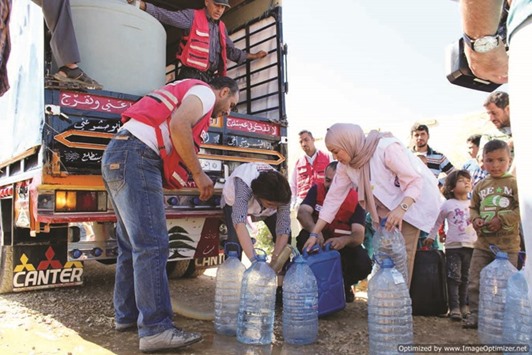A delegation from Qatar Red Crescent Society (QRCS) and Kuwait Red Crescent Society (KRCS) has visited a number of joint humanitarian projects in the North and Beqaa governorates, Lebanon.
Maha al-Barjas, KRCS secretary-general, got an overview of the work carried out by the two organisations in the service of Syrian refugees and host
communities in Lebanon.
She was accompanied by Omar Katerji, head of the QRCS mission in Lebanon; Musaed al-Anzi, head of the KRCS mission in Lebanon; and staff members from the two missions.
The tour began from Tripoli Governmental Hospital, where Dr Fawaz Hallab explained the stages of the “Syrian Refugee Preterm Neonatal Incubators” project, which is co-funded by the two organisations under a memorandum of understanding signed four months ago.
Al-Barjas stressed the importance of projects conducted jointly with QRCS, especially those targeted at refugee children, who need special care.
“It is crucial to support Lebanon. This is the responsibility of all countries, not just Qatar and Kuwait. We need to enhance co-operation between Red Crescent and Red Cross societies and civil society organisations, both local and international, to help Syrian refugees. The situation is tragic, and nobody can tell when the crisis will come to an end,”
she said.
According to Katerji, the preterm neonatal incubators project, which was initiated in March 2015, covered the costs of care for 984 Syrian preterm newborns, with a 10-day
incubator stay rate.
“As the Syrian crisis goes on, it is our duty to think and act together and invest the resources brought in by donors in significant humanitarian projects to save the lives of refugees and alleviate their suffering,” he pointed out.
Dr Hallab saw “great progress” in the incubators project in relation to the quality of medical services offered to newborns, particularly as this is the only incubator department in North Governorate, where preterm babies had been prone to death.
He highlighted the importance of co-operation between QRCS and KRCS and their efforts to save the lives of children and help the hospital continue to pursue its humanitarian work.
After that, the delegation visited a water purification plant in Saadnayel to see the process of providing drinking water for refugee camps. Lastly, they took a tour to watch a thermal insulation project and visit a breast cancer centre in Majdal Anjar.

A number of joint projects were visited by the delegation during the review.
